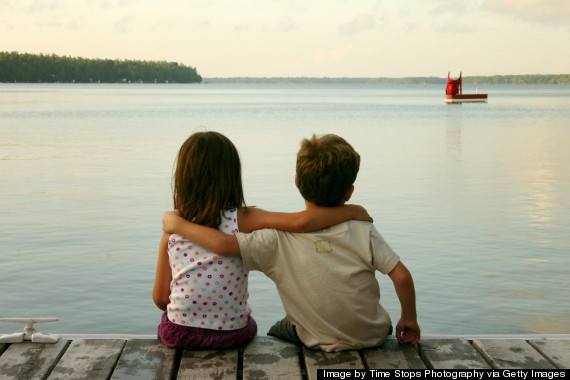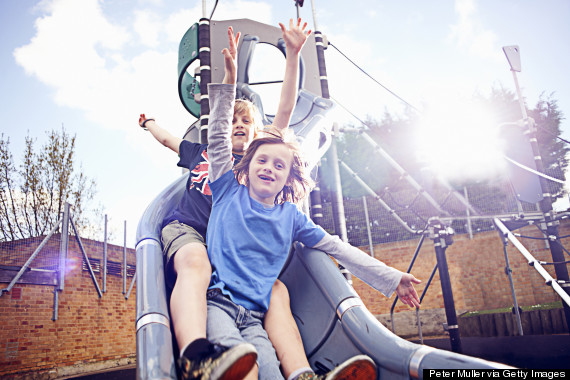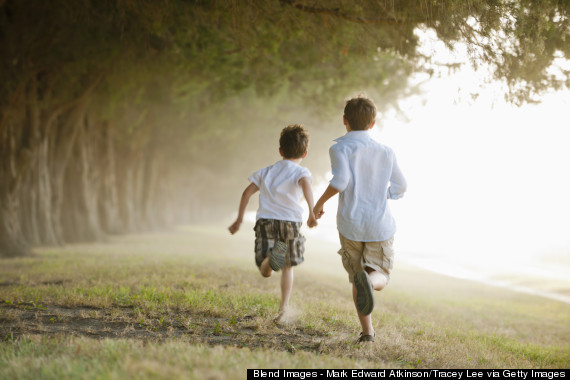
In the Harry Potter series, longtime BFFs Harry Potter and Ron Weasley demonstrated what it means to stand by your friends. They went through their first years of schooling side by side. They navigated the awkward waters of first-time relationships. They battled together metaphorically (and literally).
Pop culture is filled with other examples of indelible childhood bonds, from Tom Sawyer and Huck Finn to Tommy Pickles and Chuckie Finster. And turns out, this longer-term, seemingly more-permanent relationship may actually carry different psychological significance compared with other types of friendships, according to Scott Bea, Psy.D., a clinical psychologist at the Cleveland Clinic.
"Childhood friendships are relationships that are rooted in longevity," he tells The Huffington Post. "They're the type of relationships that last longer than any others we have because they're formed during a time where we're really seeking attachment."
Each friendship we form has special significance, but the friends we make when we're kids have a larger impact. Research suggests that strong social connectedness with best friends when we're young could lead to more happiness and increased well-being as adults.
But that's not the only reason those childhood friendships are so meaningful. Below are 10 things only our childhood friends can understand, and how they shaped us into the people we are today.
Childhood friends teach us about trust.
When we're younger, we're more receptive to people without being cynical, Bea explains. Research suggests childhood friends may teach us about what it means to trust someone -- something we don't easily do as adults.
"The club gets much more exclusive as we get older," Bea says. "The filter is much harder to get through. Those younger friendships -- because of our history of acceptance and trust, and the positive impact they have on our brains [as they're developing] -- those create our friendship habits. We tend to stick with what's familiar."
They know our strengths and weaknesses.
Childhood friends understand what makes us tick because they were around when those qualities started developing. They know about that our tendency to procrastinate (as well as our weakness for late-night pizza runs). They appreciate our good listening skills, while we cherish their gentle honesty.
Bea says that kind of unending acceptance and love can be a powerful asset in times of distress. "These qualities in a friendship really reduce our tension," he says. "Close relationships like that can be sort of like a medicine [when you're stressed]."
They lifted our self-esteem during our awkward phase -- and they still know how to do it today.
We all have that one yearbook photo we loathe from our adolescent years because it captures cringe-worthy fashion choices, braces or other embarrassing features of our past. Research suggests that adolescents with high-quality friendships experience more adjustment and higher self-esteem -- just the kind of boost we need during those formative years.
"There's this easy acceptance with childhood friends," Bea explains, noting that this kind of support is crucial, even throughout adulthood. "We're just so much more apt to be accepting when we're kids so that's how these bonds form."
Their emotional support can last well into adulthood.
Childhood best friends not only see us through our growth spurts and bad haircuts, but our emotional tribulations as well. This kind of support is crucial when we're developing because it shapes some of the emotional traits that are valued as adults, explains Carlin Flora, author of Friendfluence: The Surprising Ways Friends Make Us Who We Are.
Those bonds "not only help kids form friendships when they're older, by teaching them empathy, story-telling, perspective taking, and how to adjust one’s own behavior to the situation at hand, but also help them become psychologically and cognitively healthy in other ways," she said in a Psychology Today interview last year. "[T]he sense of belonging that comes from having a friend boosts all-around psychological well-being."
They push us beyond our comfort zone.
Who else was going to convince us to ride that roller coaster or leap off that diving board when we were kids? "Our good friends really encourage us to try things we wouldn't do otherwise, and vice versa," Bea says. "We have richer lives because of that."
They're familiar with our family dynamics.
Whether it's the heart-to-hearts we have with our moms, or the sometimes-strained dynamic with a particular sibling, childhood friends have unique insight into our family relationships like no others do. It's that knowledge -- and presence -- during a developmental time that sometimes makes those bonds stronger than many other relationships, Bea says.
We'll always have that hometown bond.
As life goes on, we grow up and move on. But being geographically separated from our hometown doesn't mean we've lost pride for the place where we grew up. A lot of that fondness, Bea says, is because of those childhood friends and memories made there.
"A lot of times what starts these friendships is just proximity," Bea says. "That kid walking in front of your house is a potential friend when you're 5 or 6 years old -- [that's] almost never the case when you're 50 or 60 years old. That will always make those particular relationships special."
They've seen us through adversity.
Failed tests and college rejections may not seem like a big deal in retrospect, but at the time, they were the picture of life's peaks and valleys. "Your childhood friends know the highs and the traumas," Bea says. "Those remembrances are really powerful to our young brains. Those things really stick with us. I think all of that -- the ups and down, the shared life stories -- make a difference in bonding."
Our world views may be more aligned.
Research suggests that not only are we influenced by our environment as we grow up, but we also seek like-minded friends in our adolescent years -- and it's these same views that set childhood friends apart from the rest, Bea says.
"We grew up in the same neighborhoods, so we have all this in common and all these shared reference points, including shared world views a lot of the time," he explains. "Those complex issues are the same elements we value in our adult friendships, too."
Bonding experiences were different than the ones with other friends.
When it comes down to it, there's simply just a different kind of kinship that forms when you navigate the trenches of growing up together.
"With friends we make early on, we have a shared developmental experience," Bea explains. "We go to school together. We graduate from school together. We start dating around the same time. We share all of that, and that creates a different bond."
